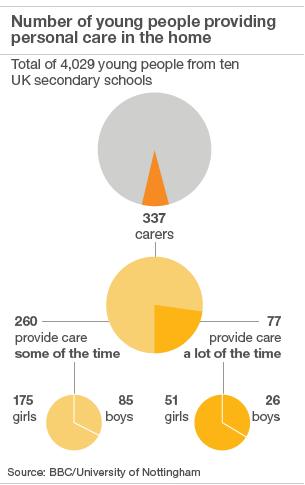Cameron warns against funding cuts for child carers
- Published
David Cameron faces questions from the child carers
Prime Minister David Cameron has warned councils against cutting funds for help for children who care for parents or siblings, in a BBC interview.
A BBC survey suggests there are four times as many young carers in the UK than previously officially recognised.
Members of a group of child carers who interviewed Mr Cameron said the clubs and centres they relied on were facing cuts as councils rein in spending.
Mr Cameron said such services save money in the long run.
He also said the government was committing £400m over four years to help to enable carers to take breaks.
In the survey, published on Tuesday, one in 12 of the 4,029 schoolchildren asked by the BBC said they had caring responsibilities - such as dressing, washing or bathing family members.
If the survey reflects the UK as a whole, this would mean there are about 700,000 young carers in the UK.
The 2001 census, however, only identified 175,000 young carers.
As the five young carers questioned Mr Cameron at Downing Street, Sarah Thomas, 16, from Shrewsbury, said the support centre she says gives her "invaluable" support was having to cut back £85,000.
And Isha Bellingy, 16, from High Wycombe, asked how Mr Cameron was going to stop councils from cutting the budgets of such projects.
Mr Cameron said councils, which face 7% budgets each year for the next four years, are responsible for their own funding decisions.
"But I'm saying to them think very carefully about the changes you make because if you take support away from things that are holding families together it'll cost you much more if the families get into trouble," he said.
'Child labour'
Ms Thomas also asked Mr Cameron how she could go away to university when she also had responsibilities caring for her mother, who has multiple sclerosis, and her father, who suffers from arthritis and other conditions.
"We've got to make sure your parents are getting proper help and not just from you... you shouldn't be held back from university just because of your circumstance," Mr Cameron said.

He said the local council should be working with the family to provide sufficient help.
Brian Buckingham, 10, from Oxford, told the prime minister that his role caring for his father was essentially "child labour".
"We want you to be a child first, and someone who's helping out at home second," responded Mr Cameron.
He said the government was trying to speed up the roll-out of personalised care budgets, to enable individuals such as Brian's father to choose and pay for the care he required.
Mr Cameron also spoke of the difficulties of caring for his disabled son, who died last year.
"I remember the first year of looking after my boy, we didn't have much help and actually we were really getting into difficulty, because actually, you need help," he said.
The government has promised more support for carers, an increase in personal budgets, which people can use to pay for care services, and a greater role for the voluntary sector.
In the spending review in October, it announced an extra £2bn by 2014 in funding for social care, although some campaigners believe this will not fully offset the cuts from council budgets.
A spokesman for the Local Government Association described young carers as "unsung heroes" and said councils wanted to provide services for them.
"The LGA trusts that future government funding announcements will allow us to do this," he said.
Councils recognised that support for young carers needed to dovetail closely with provision for the person they were looking after, and that local authorities were committed to putting in place "family focused services", he said.
'Hidden army'
A total of 4,029 pupils from 10 UK secondary schools responded to a questionnaire designed by academics at the University of Nottingham.
The questions asked about both the levels of responsibility young people have in the home, and the types of caring activity they undertake.
Of those who responded, 337 (8%) said they had carried out "personal care" of someone in their home either "a lot of the time" or "some of the time" over the last month.
This includes activities such as helping the person they care for to dress, wash, bathe or shower.
Professor Saul Becker, head of the school of sociology and social policy at the University of Nottingham, said the survey pointed to a "hidden army" of UK young carers and was a "wake-up call" to governments.
Separately, 29% of the school pupils who took part in the survey said they had carried out "emotional care" of someone in their home either "a lot of the time" or "some of the time" over the preceding month.
This could include sitting with the person they care for, reading to them, or taking them out for a walk.
While these would not all necessarily be considered young carers, it is likely that many of them are providing support for family members with mental illnesses or addictions to drugs or alcohol.
Campaigners and charity groups have been arguing for years that the official 175,000 figure is a vast underestimate.
The National Young Carers Coalition, a group of charities including the Princess Royal Trust for Carers, Barnardo's and the Children's Society, said the figures came as "no surprise".
Shadow education secretary Andy Burnham said it was "absolutely crucial" that young carers were identified and supported.
He warned that "ill-thought-through reforms" in health and education could result in "disjointed and fragmented local services".